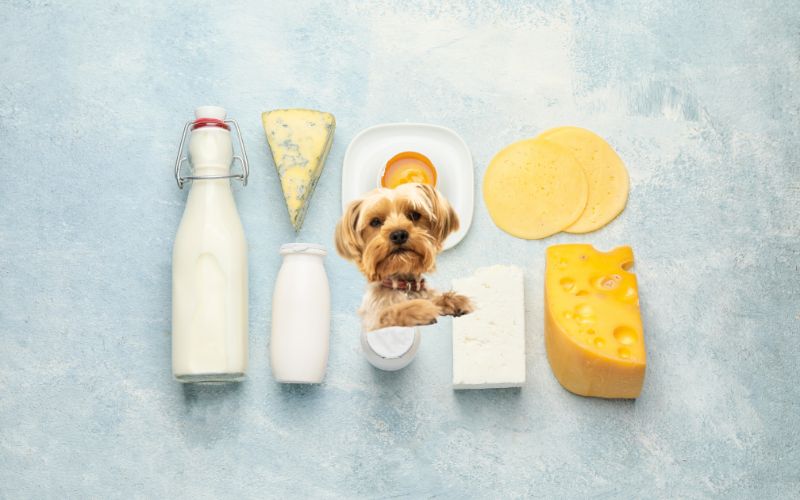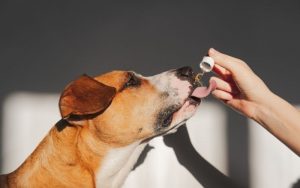Many people are unaware that their dogs can be lactose intolerant.
In fact, just like humans, dogs can have difficulty digesting lactose if they don’t have enough of the enzyme lactase to break it down.
This article will explore what lactose intolerance is in dogs, the symptoms, and what you can do to help your dog if they are diagnosed with this condition.
The quick answer is yes, dogs can be lactose intolerant. In fact, it’s not uncommon for dogs to have trouble digesting lactose, the sugar found in milk and other dairy products. Just like with humans, the severity of a dog’s lactose intolerance will vary from case to case. Some dogs may be able to tolerate small amounts of lactose without any issues, while others will experience severe digestive upset after consuming even a tiny bit of dairy.
What is lactose intolerance and what are the symptoms?
Lactose intolerance is a digestive problem that can occur in dogs of any age.
The symptoms of lactose intolerance are caused by the inability to digest lactose, which is a type of sugar found in milk and other dairy products.
When lactose is not properly digested, it can cause gastrointestinal problems such as diarrhea, vomiting, and gas.
Some dogs may also experience weight loss, dehydration, and a decreased appetite.
If your dog is showing any of these symptoms, it’s important to take them to the vet for a diagnosis.
Lactose intolerance is not a serious condition, but it can be uncomfortable for your dog.
With proper management, most dogs with lactose intolerance can live happy, healthy lives.

How do I know if my dog is lactose intolerant?
If your dog seems to be having tummy troubles after eating dairy products, it’s important to find out if they are intolerant.
The most common symptom of lactose intolerance in dogs is diarrhea, although some dogs may also experience vomiting, gas, or bloating.
If your dog is showing any of these symptoms, it’s best to consult with your vet to find out for sure.
They may recommend doing an elimination diet, which involves removing all dairy products from your dog’s diet for a period of time to see if their symptoms improve.
With a little detective work, you can figure out if your dog can enjoy dairy treats without tummy trouble.
What can I do to help my dog if they are lactose intolerant?
The first step is to talk to your veterinarian, who can confirm the diagnosis and recommend a course of treatment.
Once you know that your dog is lactose intolerant, there are a few simple steps you can take to make sure they stay healthy and happy.
Avoid giving them milk or other dairy products, as these can trigger digestive problems.
Instead, opt for lactose-free dog food or a homemade diet that does not contain any dairy products.
You should also make sure your dog has access to plenty of fresh water, as dehydration can exacerbate the symptoms of lactose intolerance.
By taking these simple precautions, you can help your lactose-intolerant dog live a long and healthy life.
Alternatives to dairy for dogs
Many commercial dog foods contain dairy products, such as milk, cheese, and yogurt.
However, some dogs are lactose intolerant and may experience gastrointestinal distress after consuming dairy, even in small amounts.
Luckily, there are a number of dairy-free alternatives that can be used as part of a healthy diet for dogs.
For example, coconut milk is rich in vitamins and minerals, and it can be easily added to your dog’s food.
Rice milk is another option that is low in lactose and easy on the stomach.
You can also find commercially-produced vegan dog foods that do not contain any animal products, including dairy.
By choosing one of these alternatives, you can help your dog stay happy and healthy.
Final Words
Lactose intolerance is fairly common in dogs, just as it is in humans.
If you think your dog may be intolerant to lactose, the best thing to do is eliminate dairy from his diet for a couple of weeks and see if his symptoms improve.
If they do, slowly reintroduce dairy products back into his diet until you find the right balance.
However, if his symptoms persist after eliminating dairy from his diet, it’s important to consult your veterinarian as there may be another underlying cause.
Read Next
- Can Corona Virus Infect Dogs?
- Best essential oils for working dogs?
- Do spaniels have webbed feet? Yes, they do but why?
- Top paw care tips for spaniels – What you need to know
- How to prevent heatstroke in spaniels (plus 5 other summer hazards)
- What can you give a dog to stop diarrhea? What you should know










